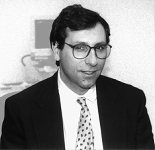


 Initiatives interviewed Joe Paladino, program manager for the U.S. Department of Energy's Technology Exchange Division, which is within the Office of Technology Transfer and Program Integration, on February 14, 1995.
Initiatives interviewed Joe Paladino, program manager for the U.S. Department of Energy's Technology Exchange Division, which is within the Office of Technology Transfer and Program Integration, on February 14, 1995.
DOE's Office of Technology Development no longer has a small business technology integration program, but even without it, small businesses play a big part in developing the technologies needed for environmental cleanup. Why? "Because they have really good ideas," said Joe Paladino, who worked with the program several years. "I have always thought, and I think Clyde Frank [Deputy Assistant Secretary for the Office of Technology Development] agrees, there is an incredible reservoir of capability in the small business community. Many of the innovative technologies that we need are derived from the small business community."
While working with the small business program, Paladino's focus began to shift. "I started getting involved with technology transfer and commercialization of our technologies because [while] it's possible to work on small business stuff, if we don't fix the way we communicate with industry from a larger perspective, we can't fix the things that are failing the small business community." Now, Paladino is continuing his technology transfer and commercialization work within OTD's landfill stabilization focus area. He is also maintaining his small business ties by serving as a liaison to DOE's Small Business Innovation Research program.(see related article in this issue)
While helping small businesses get involved with DOE's research programs, Paladino became familiar with the barriers small businesses often face. "One of the major hindrances I saw was the lack of information on opportunities to participate in our programs. I started to serve as a broker of information." Paladino observed that, "It's not whether you are a small business or a big business. It's whether you're in the system or not in the system. Once small businesses have task-order-oriented contracts, they're in the system. But it takes a lot of energy to get that opportunity." To help get information to small businesses, Paladino said OTD set up a toll-free hotline that received as many as 800 calls a month. In addition, Paladino helped plan four small-business-oriented workshops where small business operators met face-to-face with people who could provide them with information on business opportunities in DOE.
Paladino said DOE's sites are also starting to become aware of the need to bring in new technologies and pay attention to the businesses that have good ideas. For example, DOE's Savannah River Site had a forum for all the businesses in the region to share the site's needs and to invite proposals for technologies. In a separate pilot program, a Washington, D.C.-based company is taking a hard look at DOE's Rocky Flats site to identify opportunities for the small businesses in the region. "What this company is trying to do is reduce the energy that the small business needs to expend to really get good market information on business opportunities at a site," Paladino explained. "Now they [small businesses] have a champion to actually get them into the DOE."
Another program OTD supports provides business planning assistance to recipients of a Small Business Research Innovation award. Paladino said, "I'm proposing that we provide that same assistance to small businesses that are currently in our technology development program [but] are not SBIR." In addition to teaching the businesses how to write a business plan, the program brings in partners that can provide venture capital to keep the business going during the start-up phase.
Finally, George Mason University is conducting a study for OTD to look at the barriers small businesses face when working with DOE. The research includes looking at case studies of relationships that have been successful and those that haven't worked as well. According to Paladino, "The results will pinpoint where the real barriers are and what DOE could do to improve the way we access these better small business technologies."
For small businesses interested in learning more about DOE's programs and technology needs, Paladino recommended obtaining copies of several documents from EM's hotline, (800) 7EM-DATA (736-3282). Upon checking with the staff at the hotline, Initiatives learned the documents are being revised and are not available at this time. When they are available, it will be announced in the newsletter. In the mean time, call the staff at the hotline with questions. If they don't have an answer close at hand, they'll get one and call back.
For information about small business involvement other than in technology development, Paladino suggests calling Kay Rash, the small business coordinator for the Office of Environmental Management. Her number is (202) 586-5420. Rash can provide one-on-one counseling to small, disadvantaged, or minority businesses interested in working on support services for EM's headquarters operation. She can also get businesses in touch with procurement offices at DOE sites.
Photo: Joe Paladino has worked with small business technology innovators as part of DOE's Office of Technology Development. Photo by Elaine Specht.